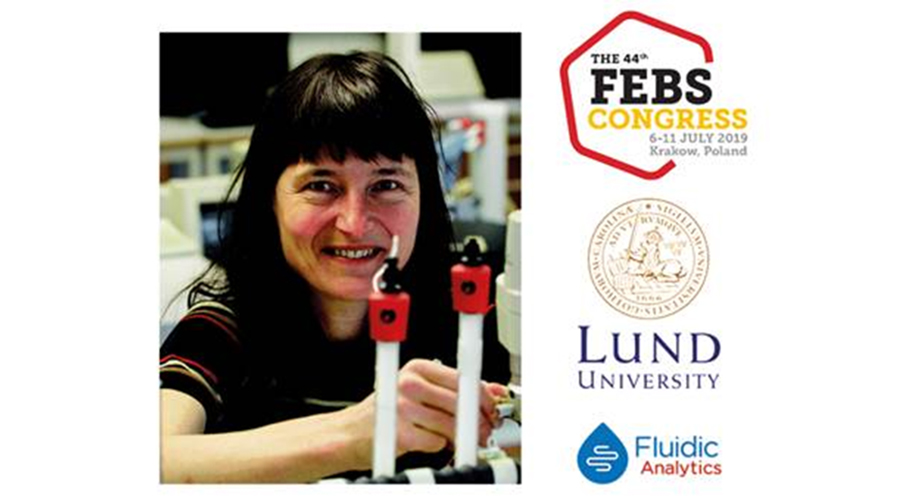Fresh data on protein interactions in Alzheimer’s disease

Professor Sara Linse will highlight the Fluidity One-W as an influential technology for protein interaction analysis during plenary lecture at FEBS 2019.
Demonstrates the unique ability of diffusional sizing to assess protein binding in-solution and for difficult-to-study systems.
Fluidic Analytics’ diffusional sizing technology has been influential in a recent study that investigates protein binding and self-assembly in Alzheimer’s disease. This work will be presented by Professor Sara Linse of Lund University, Sweden, during the FEBS/EMBO Women in Science Award plenary lecture at FEBS 2019, Krakow, Poland (Sunday 7 July at 2 pm). Her work on the mechanism of amyloid β aggregation and the role of inhibitors demonstrates the unique ability of diffusional sizing to assess protein binding in-solution and for difficult-to-study systems.
Fluidic Analytics will host an extended Q&A session with Professor Linse at their booth (number 7) at 3 pm following her plenary talk. Visitors to the Fluidic Analytics booth will also be able to have an early look at the Fluidity One-W before its official launch later this year. This instrument has the ability to assess on-target protein interactions in solution and in crude biological backgrounds – opening up the possibilities for detailed analysis of proteins in their near-native states and natural environments. The system is easy-to-use, and based on the well-understood relationship between size and diffusion rate, providing researchers with true confidence in the quality and accuracy of their data.
Professor Sara Linse, Department of Biochemistry and Structural Biology, Lund University commented: “During our research into protein amyloid formation, we have used many different techniques for assessing protein interactions – all with different limitations and advantages. With diffusional sizing, we were able to confidently generate accurate and complete in-solution data using amyloid proteins to connect stoichiometry and binding affinities with protein self-assembly. The data we will present at FEBS 2019 could provide key insights for novel therapeutic approaches in Alzheimer’s disease. The Fluidity One-W has contributed significantly to this detailed understanding.”
With applications ranging from neurobiology and cell signalling to drug discovery, the potential impact of diffusional sizing in fundamental scientific research is vast and spans many research areas. Dr Sean Devenish, Head of R&D at Fluidic Analytics explained: “The unique capabilities of the Fluidity One-W position it as the only viable option for analysing difficult-to-study proteins, like amyloid fibrils, in solution. Researchers gain the best insight into what their protein of interest is interacting with, and how, even in complex backgrounds such as crude lysates. The technology is opening up many new avenues of research into protein interactions and expanding the systems that can be studied, and Professor Linse’s recent work is a great example of what’s possible with this new approach to protein analysis.”
Related News
-
News Eli Lilly’s Alzheimer’s drug receives approval from US FDA
After facing several hurdles on its path to approval last year, Eli Lilly’s donanemab treatment for early Alzheimer’s, brand name Kisunla, received US FDA approval this past week. It is the second therapy for slowing the progression of Alzh... -
News This week in GLP-1 drug headlines: Manufacturing investment and new market launches
As drugmakers race to put their own GLP-1 drug products forward as the next biggest thing in weight-loss, current products are making numerous headlines this week with a number of new developments in their commercialisation and approval. Discover the l... -
News Women in Pharma: Regulating equity across regional borders
In our monthly series focusing on women in the pharmaceutical industry, we interview leading experts in the pharmaceutical supply and value chain to discuss the importance of gender diversity in healthcare, the workplace, and beyond. -
News Viral marketing for B2B pharma businesses: a CPHI Online case study
Discover how a Chinese chemical manufacturing company went viral on TikTok, and what their viral success means for the future of B2B digital marketing for the wider pharmaceutical industry and supply chain. -
News New Aurigene biologics facility opens in Hyderabad, India
Aurigene Pharmaceutical Services Ltd. have opened a biologics facility in Hyderabad, India in a biocluster known as Genome Valley. -
News Novo Nordisk launches 'Power of Wegovy' national campaign
Danish drugmaker Novo Nordisk have launched a new national campaign – The Power of Wegovy – that aims to educate those living with obesity on their blockbuster drug Wegovy throughout the United States. -
News Women in Pharma Anniversary: Celebrating Our Heroines of Pharma
Our Women in Pharma interview series is approaching its 1-year anniversary this month, and to celebrate, we are highlighting the Heroines of Pharma that our very own Women in Pharma admire. -
News Sanofi gains rare disease therapy in acquisition of Inhibrx for US$1.7 billion
Sanofi completed the acquisition of the clinical-stage biotech company Inhibrx in late May 2024 after settling on a US$1.7 billion buyout. The acquisition brings with it a rare disease therapy to bollster Sanofi's pipeline.
Position your company at the heart of the global Pharma industry with a CPHI Online membership
-
Your products and solutions visible to thousands of visitors within the largest Pharma marketplace
-
Generate high-quality, engaged leads for your business, all year round
-
Promote your business as the industry’s thought-leader by hosting your reports, brochures and videos within your profile
-
Your company’s profile boosted at all participating CPHI events
-
An easy-to-use platform with a detailed dashboard showing your leads and performance
.png)
.png)
.png)

.png)
.png)
.png)
